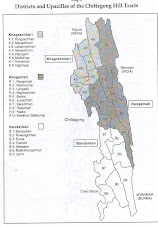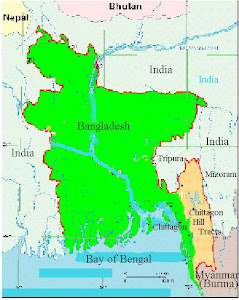Speakers tell Bapa-Ben conference
Staff Correspondent
Ensuring legal and traditional rights of indigenous people to land will save environment and protect the country from natural calamities, said the speakers at a conference yesterday.
They also criticised different government projects such as social afforestation and eco-park that evict the indigenous people by occupying their lands and habitats.
The conference on 'Indigenous People and Bangladesh Environment' has been organised jointly by Bangladesh Paribesh Andolon (Bapa) and Bangladesh Environment Network (Ben) in association with eight departments of eight public universities including Dhaka University and Jahangirnagar University at the Institution of Engineers, Bangladesh auditorium in the city.
The two-day conference is the first of its kind where indigenous representatives from different parts of the country, social workers and researchers are taking part.
Speakers at the conference laid emphasis on participatory concept of development while planning projects, inter-country policy to prevent environmental pollution from neighboring countries and bringing indigenous people under the process of modernisation by upgrading their earnings.
“Legal rights of indigenous people must be ensured to save the environment where they live in, and they must be brought under the process of modernisation,” said Prof Nazrul Islam, coordinator of Ben.
“The indigenous people are born and brought up in the lap of nature. The way they earn, they cultivate and above all they survive have its own tradition and close connection with the nature that includes hills, rivers, forests and even the plain land. So ensuring their right means taking steps to save the environment,” he added.
“Whether it is in plain land or up in the hill, what our policymakers always do while taking up or planning a development project is that they never take into consideration the views of the local people,” said Prof Muzaffer Ahmad, president of Bapa.
“Our environment is threatened and to save it we need to kick off a coordinated effort based on mutual understanding and ensuring fundamental rights of every human being,” he added.
Prof Abdullah Abu Sayeed, chairman of the inaugural session, said, “The indigenous people were deprived of their rights to give dishonest people the opportunity to exploit and loot their life and livelihood.”
The speakers made a 12-point demand at the session to ensure the rights of indigenous people including their constitutional approval, access to primary education in their own mother tongue besides the existing curriculum, right to land, separate ministries for the indigenous people and implementation of the peace treaty.
Awami League Presidium Member Motia Chowdhury said problems of indigenous people with regard to language, forest, agriculture and environment must be addressed with a holistic approach.
She said Chittagong Hill Tracts Peace Accord should be the basis of solving the problems of indigenous people.
Motia admitted that the then government should have implemented the peace treaty more speedily and effectively.
General Secretary of the Communist Party of Bangladesh Muzahidul Islam Selim said the problem of the indigenous people should be viewed from political and economic perspective.
He also laid emphasis on ensuring an environment in the country where each ethnic group can flourish with its distinct culture and tradition.
“An inter-country policy should be formulated to save our environment from its threatened condition. After 50 years indigenous people in Sylhet will have to evacuate their present habitat as huge sands from India are filling our rivers,” said Shefalika Tripura.
Chaired by Bapa Vice-president ASM Shahjahan, the plenary session was also addressed by Rocky Chakma and Trimati Tanchanga.
A total of 21 papers were presented at the session while 27 papers will be presented today.
The programme also incorporates children's art exhibition, film projection and cultural function.
Source from-http://www.thedailystar.net/story.php?nid=15920
skip to main |
skip to sidebar


Map of Bangladesh

CHTs is number one Milliary zone in the world


Ministry of Chittagong Hill Tracts Affairs
The United Nation
The IJPMNA
This page provides information of the minority Indigenous Jumma Peoples in Chittagong Hill Tracts (CHTs) Bangladesh.
Contact with this please write:-ijpnusa@yahoo.com
Contact with this please write:-ijpnusa@yahoo.com
About Us
Location of Jummaland

Jumma Videos
- The BANDARBAN SADAR
- The Rowangchari
- The Ruma
- The Lama
- The Thanchi
- The Alikadom
- The Naikhkhongchari
- The RANGAMATI SADAR
- The Baghaichari
- The Langudu
- The Nanyachar
- The Barkal
- The Jurachari
- The Bilaichari
- The Kaptai
- The Rajsthali
- The Kawkhali
- The KHAGRACHARI SADAR
- The Manikchari
- The Laksmichari
- The Mahalchari
- The Matiranga
- The Ramgarh
- The Dighinala
- The Panchari
Audio & Video
Jumma Natok (Drama)
International Support
Educational Institution
Religious Organization
Buddhist Studies

Map of Bangladesh
Mission of Bangladesh
About Bangladesh
Bangali Audio Songs
Bengali News

CHTs is number one Milliary zone in the world
Online Audios
Refugee in Homeland

Jumma Picture

Blog Archive
About Me
- The Indigenous Jumma Peoples Movement in North America
- The Chittagong Hill Tracts (CHT) region comprises three districts: Banderban , Khagrachari and Rangamati. The districts comprise seven main valleys formed by the Feni, Karnafuli, Chengi, Myani, Kassalong, Sangu and Matamuhuri rivers aid their tributaries and numerous hills, ravines and cliffs covered with dense vegetation, which are in complete contrast to most other districts of Bangladesh, which consist mainly of alluvial lands. Geographically the CHT can be divided into two broad ecological zones: (a) hill valley, (b) agricultural plains. It is surrounded by the Indian states of Tripura on the north and Mizoram on the east, Myanmar on the south and east and Chittagong district on the west.
